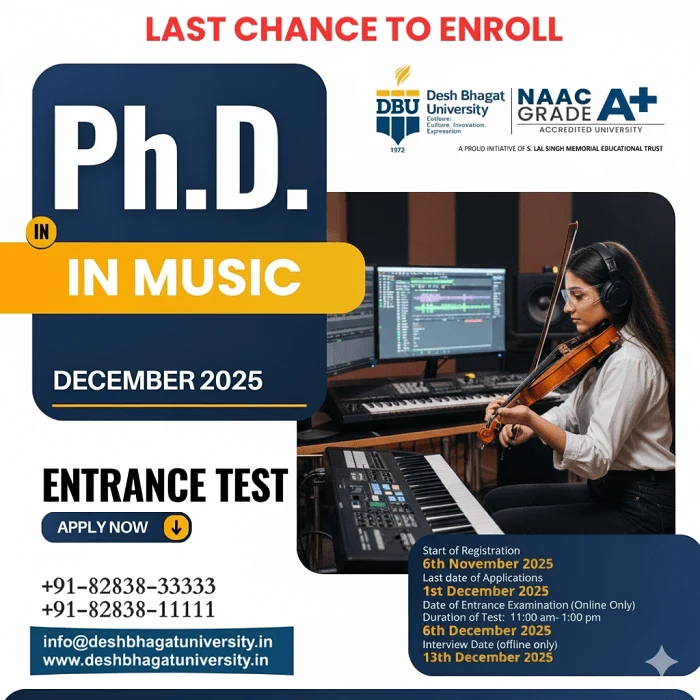PhD in Music in India: Eligibility, Salary, Syllabus & More
November 8, 2025 2025-11-08 7:07PhD in Music in India: Eligibility, Salary, Syllabus & More

PhD in Music in India: Eligibility, Salary, Syllabus & More
What is Music?
Music is an art form that arranges sounds in time to express ideas or emotions. It uses rhythm, melody, harmony, timbre, and dynamics to create patterns that human beings find meaningful. Noise, by contrast, is sound without clear structure or intention — random vibrations, unwanted interference, or chaotic elements lacking the organised features that music has. So the difference between music and noise lies in purpose and form: music is crafted and perceived as meaningful, whereas noise often lacks that structure or intent.
What is a PhD in Music?
A PhD in Music is the highest academic degree in the Field of music studies. It combines advanced coursework, original research, and a doctoral thesis in an area of music such as performance studies, musicology, ethnomusicology, composition, music technology, or related fields. At Desh Bhagat University (DBU), students who wish to deepen their knowledge of music as art and research can pursue doctoral studies (subject to the university offering that specific subject), thereby contributing to scholarship and possibly entering academia, research, performance, or pedagogical roles.
PhD in Music in India – Why it Matters
Pursuing a PhD in Music in India opens up a range of possibilities:
- It establishes one as a specialist in the field of music.
- It allows engagement with research, culture, theory, and practice of music in the Indian context (and globally).
- It qualifies you for academic and teaching roles in colleges, universities, or specialised institutions.
- It empowers you to contribute original knowledge to music studies—analysing traditions, new technologies, performance practices, or cultural contexts.
- At DBU, which holds NAAC A+ accreditation, doctoral‑level research can be done in a supportive environment of faculty, library, and research support.
Eligibility for PhD in Music at DBU
While DBU may not list explicitly a programme titled “PhD in Music” in its public pages (it does refer to MA Music and general PhD eligibility), the general eligibility criteria for PhD programmes at the university apply and give a good guide:
- You need a Master’s degree (or equivalent) in a relevant discipline with a minimum percentage (typically 55% for general category) of marks and 50% for reserved categories.
- You must clear the university’s PhD Entrance Exam and/or other relevant tests.
- You will be required to submit a research proposal that outlines your intended doctoral research. Duration: The typical PhD programme spans a minimum of 3 years and up to 6 years, depending on progress.
- In some cases, for direct admission after a four‑year bachelor’s degree (under new UGC guidelines) there may be possibilities, but you should check with the university’s admissions office.
If DBU introduces a PhD in Music, these criteria would apply with a focus on music/musical disciplines. That means if you have an MA in Music (or equivalent) and meet the marks criteria, you can apply, prepare a strong research proposal in music, and clear the entrance & interview.
PhD in Music Syllabus – What Could Be Covered
While DBU doesn’t publish a detailed syllabus specifically for a PhD in Music publicly (from available pages), we can outline what a typical syllabus might include, customised to a music discipline, based on general doctoral prerequisites:
Year 1 (Coursework phase)
- Research Methodology in Music: covering qualitative and quantitative methods, case‑studies, archival research, and fieldwork.
- Music Theory & Analytical Techniques: advanced harmony, counterpoint, form analysis, contemporary music theory.
- History & Culture of Music: survey of Indian classical music, folk music traditions, world music, ethnomusicology.
- Music Technology & Production (if relevant): sound recording, digital audio workstations, analysis of recordings, and performance technologies.
- Seminar & Literature Review: an extensive review of current research in music studies.
Year 2 (Transition to Research)
- Comprehensive Exams or Progress Review.
- Proposal development: refining the research question, methodology, ethics, and instrumentation.
- Workshop/Colloquium: presenting interim research work, peer review.
- Initial Research Data Collection or Field Work: interviews, performances, archival work, and composition.
Years 3‑6 (Full Research & Thesis)
- Conducting original research: analysis of musical phenomena, performance practice, compositional work, historical study, pedagogy, technology, etc.
- Writing thesis: drafting chapters, submitting for review, and revisions.
- Publication/presentation: producing at least one peer‑reviewed paper or conference presentation (often encouraged).
- Viva‑Voce / Defence of Thesis: finishing the doctoral requirement and getting the PhD awarded.
PhD in Music Salary – What to Expect
It’s hard to give exact figures for a PhD in Music because outcomes vary depending on role (academic, research, performance, pedagogy) and institution (college, university, cultural organisation, private sector). However, using DBU‑published data for related PhD disciplines gives a useful benchmark.
For example, in a related humanities/language discipline, DBU reports that a PhD can lead to university professor roles. In the case of a language subject, salary ranges at DBU for similar doctoral holders are quoted at ₹6,00,000 to ₹8,00,000 per annum for assistant professors in one example.
Based on that, a candidate with a PhD in Music might expect:
- Entry academic position (Assistant Professor/Lecturer) in India: roughly ₹5 – 8 lakhs per annum (may vary with institution, location, performance record).
- With experience, senior roles (Associate Professor, Professor, Head of Department) could reach ₹10 – 15 lakhs or more per annum (similar to other humanities disciplines in India).
- If the role is performance or industry‑oriented (music production, composition, consulting for media, etc), salary may vary widely depending on project and reputation.
- Additional income may come from concerts, recordings, guest lectures, workshops, royalties — beyond basic salary.
In summary: a PhD in Music opens doors to respectable academic salaries and positions, but actual income will depend heavily on institution, performance track record, extra‑academic engagements, and reputation.
What is the Difference between Music and Noise?
Earlier, we defined music as structured, meaningful sound, and noise as unstructured, often unwanted sound. To elaborate:
- Intentionality: Music is created with intent — to communicate, to move emotion, to entertain, or to express. Noise usually lacks such conscious design and may be random or disruptive.
- Structure: Music uses patterns: rhythm, harmony, melody, and form. Noise often lacks repeating structure, predictable patterns, or aesthetic framing.
- Perception: Music is perceived as pleasing (or intentionally challenging) by listeners, and can evoke responses; noise tends to be perceived as bothersome, chaotic, or meaningless.
- Context: What is noise in one context may be music in another (e.g., experimental/ambient music uses elements traditionally considered noise). The boundary is not fixed, but the difference lies in framing and reception.
- Purpose/Function: Music serves purposes like aesthetic enjoyment, cultural expression, ceremony, entertainment, and healing; noise often just exists as a by‑product of activity or environment, not for aesthetic function.
In the context of a PhD in Music, distinguishing music from noise is essential because research may involve analysing how sound becomes music in a given cultural or technological setting, how listeners interpret sounds, or how new technologies blur the boundary between music and noise (e.g., sound art, ambient music, electroacoustic composition).
Why Choose DBU for Your PhD in Music?
The university environment offers much strength for doctoral research:
- DBU is NAAC A+ accredited, which signals strong quality in higher education.
- The university explicitly offers research programmes (PhD) across many fields and focuses on research infrastructure, publications, IP, and collaborations.
- The MA in Music is already listed, showing DBU has a music department or focus, which makes it plausible as a base for doctoral work in music.
- DBU offers an engaged campus life, modern facilities, and an academic ecosystem that supports students in advanced programs.
If you are interested in pursuing a PhD in Music at DBU, you should contact the university’s research office to ask:
- Whether a formal PhD in Music programme is currently offered or planned.
- Specific eligibility criteria for the Music discipline (which may vary slightly).
- Availability of supervisors in music, their research interests, funding, labs/studios for music research/performance.
- Fee structure, possible scholarships, or assistantships.
- Timeline, admission form, and important dates for the entrance test/interview.

Key Takeaways
- A PhD in Music is the highest academic degree in the music discipline and allows deep, original research in musicology, performance, technology, pedagogy, or related areas.
- At DBU, general PhD eligibility requires a Master’s degree with minimum marks (typically 55% general, 50% reserved), submission of a research proposal, clearing an entrance test and interview, and a programme duration of 3‑6 years.
- The syllabus for a PhD in Music would involve coursework in research methods, music theory/history/technology, followed by intensive research and thesis work.
- Salary after a PhD in Music in India varies, but entering academic roles may pay ~₹5‑8 lakhs annually, rising with experience; roles in performance/industry may vary more widely.
- The difference between music and noise lies in intentional structure, purpose, perception, and cultural framing.
- DBU is a reliable university with proper accreditation and resources, making it a good option for doctoral research. However, you should check if they specifically offer a program in Music.
FAQs
1. What is a PhD in Music?
A PhD in Music is a higher academic degree for people who want to study music deeply and research new ideas. It includes advanced coursework, research, and writing a thesis. This degree allows you to become an expert in a specific area of music, such as performance, history, or composition.
2. What are the eligibility criteria for a PhD in Music in India?
To apply for a PhD in Music, you typically need a Master’s degree in Music or a related field. You should have a minimum of 55% marks in your Master’s degree, and you must pass the university’s entrance exam. Additionally, you need to submit a research proposal for your PhD work.
3. How long does it take to complete a PhD in Music in India?
A PhD in Music generally takes around 3 to 6 years to complete. The first part includes coursework and exams, while the second part focuses on original research and writing your thesis. The duration can vary depending on the research and progress made by the student.
4. What is the syllabus for a PhD in Music?
The syllabus for a PhD in Music may include subjects like research methodology, advanced music theory, music history, ethnomusicology, and music technology. The first year usually covers coursework and exams. After that, the focus shifts to research and writing a thesis in your chosen area of music.
5. What are the career options after completing a PhD in Music?
After earning a PhD in Music, you can pursue various career paths, such as becoming a university professor, music researcher, composer, or music critic. You may also work in the music industry, for cultural organizations, or as a consultant for music productions or performance projects.
6. What is the salary of a PhD in Music graduate?
The salary for a PhD in Music can vary depending on the job. For academic positions, such as a university professor, the salary may range from ₹5,00,000 to ₹8,00,000 per year, depending on experience and position. If you work in the music industry or as a performer, your earnings may differ based on projects and fame.
7. Can I pursue a PhD in Music without a Master’s degree in Music?
Most universities require you to have a Master’s degree in Music or a similar field to apply for a PhD. However, some universities may allow students with a strong background in music performance or composition to apply, provided they meet other academic requirements and pass an entrance test.
8. What is the difference between music and noise?
Music is a structured arrangement of sounds created to express emotions or ideas. It follows patterns of rhythm, melody, and harmony. Noise, on the other hand, is a random, disorganized sound that doesn’t have any clear structure or purpose. Music is considered pleasant or meaningful, while noise is often seen as unpleasant or chaotic.
9. What skills do you need for a PhD in Music?
To succeed in a PhD in Music, you need skills in research, critical thinking, and analysis. You should be able to interpret music deeply, understand music theory, and conduct original research. Strong writing skills are also important to write your thesis and present your findings clearly.
10. How do I apply for a PhD in Music at Desh Bhagat University?
To apply for a PhD in Music at Desh Bhagat University, you need to have a Master’s degree in Music, meet the university’s eligibility criteria, and pass the PhD entrance exam. You will also need to submit a research proposal.






